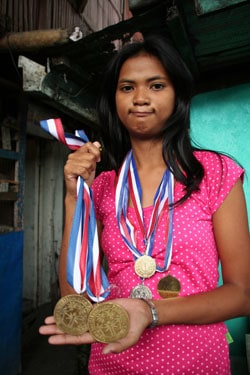
At the 12th Philippine Special Olympics, Emilda Soriano won a gold medal, two silver medals and a bronze medal in track and field. Her national triumph qualifies her for the 2011 Special Olympics World Summer Games in Athens, Greece.
The Philippine games represented the first time Emilda was away from her parents. The Special Olympics were held at Pangasinan in the north of the Philippines, many kilometers away from where Emilda lives in Iloilo, in the southern part of the country.
Emilda had a high fever on the day of the competition. Reynaldo, Emilda’s father, says,
“I cried so hard thinking about how she was doing. I got worried because I knew she would still compete despite the fever. I was so sad we couldn’t be with her.”
Despite her high fever, Emilda did compete and win the 100-meter dash.
“She was very happy. Well, she’s always happy after running at the track. Winning or losing doesn’t really matter. It doesn’t even matter whether she was in a competition or not. She just loves to run,” says her coach, Gen Mahinay.
Months before the competition, the chances of Emilda joining the national event were very bleak. Her parents could not afford to buy her new shoes, a uniform and vitamins. They had no money to pay for the psychological and medical tests necessary before competing. They couldn’t even afford the transportation fare to go to the local sports complex for practice.
For Emilda and her mother to go to practice twice a day — once in the morning and once in the afternoon — they need close to $1.25 a day. That’s a huge amount for parents who sometimes can’t afford to feed their two daughters.
So Emilda and Vilma walk four kilometers every day to the sports complex.
Reynaldo earns $6.25 a week as a tombstone maker. Vilma tries to augment this by washing clothes, but she can’t work every day because she can never let Emilda out of her sight.
“She is a teenager now, and living in this neighborhood is dangerous, especially for someone who is mentally challenged.”
The family lives in a crowded squatter community beside the public cemetery. Half-naked drunken men litter the streets every hour of the day.
For 10 long years, Reynaldo and Vilma hoped for Emilda to get well. When she was 2 years old, Emilda had a convulsion from high fever. She was unconscious for six days. After she woke up she never responded to people in a normal way.
Vilma enrolled her precious daughter in a regular kindergarten only to be disappointed that Emilda could not grasp the basic concepts that a child her age should easily understand. Vilma held on. She worked hard washing clothes and used the family’s little money to keep sending their daughter to kindergarten for 5 years.
Emilda never recovered.
Still today, Emilda cannot recognize letters, colors, or numbers; she can’t sing, dance, or memorize Scriptures. Although she can talk and communicate, she can’t stay focused on a conversation long and loses a sense of what she’s saying after a few sentences. But she can run.
“My problem was she couldn’t run in a straight line,” Coach Gen explains. “But she practices so hard every time. I tied her foot to the end of the lane so she could see where to go and somehow that worked.”
In several of the local competitions in Iloilo, Emilda lost some races because she would crisscross from lane to lane, although she sometimes did cross the finish line first.
A few weeks before the Special Olympics in Pangasinan, Joseph Alba, the director of Salem Student Center, called Vilma to tell her the good news. Emilda would compete at a national level. The student center bought her new shoes, a uniform, plane tickets and paid for the psychological and medical tests.
“We will support Emilda all the way. We are very proud of her achievements.”
Although the student center and the church can shoulder Emilda’s local and national competition expenses, it’s beyond their ability to help her compete internationally.
The government cannot financially support athletes competing in the Special Olympics and so help must come from elsewhere.
Emilda lost her chance to compete in one international competition because her family did not have the money. Nobody backed her up.
Today, Emilda is one of the best-known students at the Integrated School for Exceptional Children of Iloilo City. She got into this school because of Compassion, and it is here that she was introduced to running.
Reynaldo and Vilma make sure to save the $27 for her annual tuition fee, and Emilda continues to train at the sports complex every day with her mother.
“I would give everything for my daughter. Now that she is enjoying life as an athlete, I try not to worry about her future when she would be by herself once we leave this life. Hers is a very bleak future.”
Because of financial lack, Reynaldo and Vilma may never see their special child’s triumphant moments on the track. If indeed she became the first Compassion-sponsored child to win an Olympic medal someday, they may just have to settle with hearing stories about it.
“We’re just hoping that someday the competitions would take place here in Iloilo where we only have to walk four kilometers to see our daughter compete.”
Editor’s note: This story was originally written in 2009. Compassion Philippines now requests your help to send Emilda to Greece to compete in the 2011 Special Olympics World Summer Games this June.
